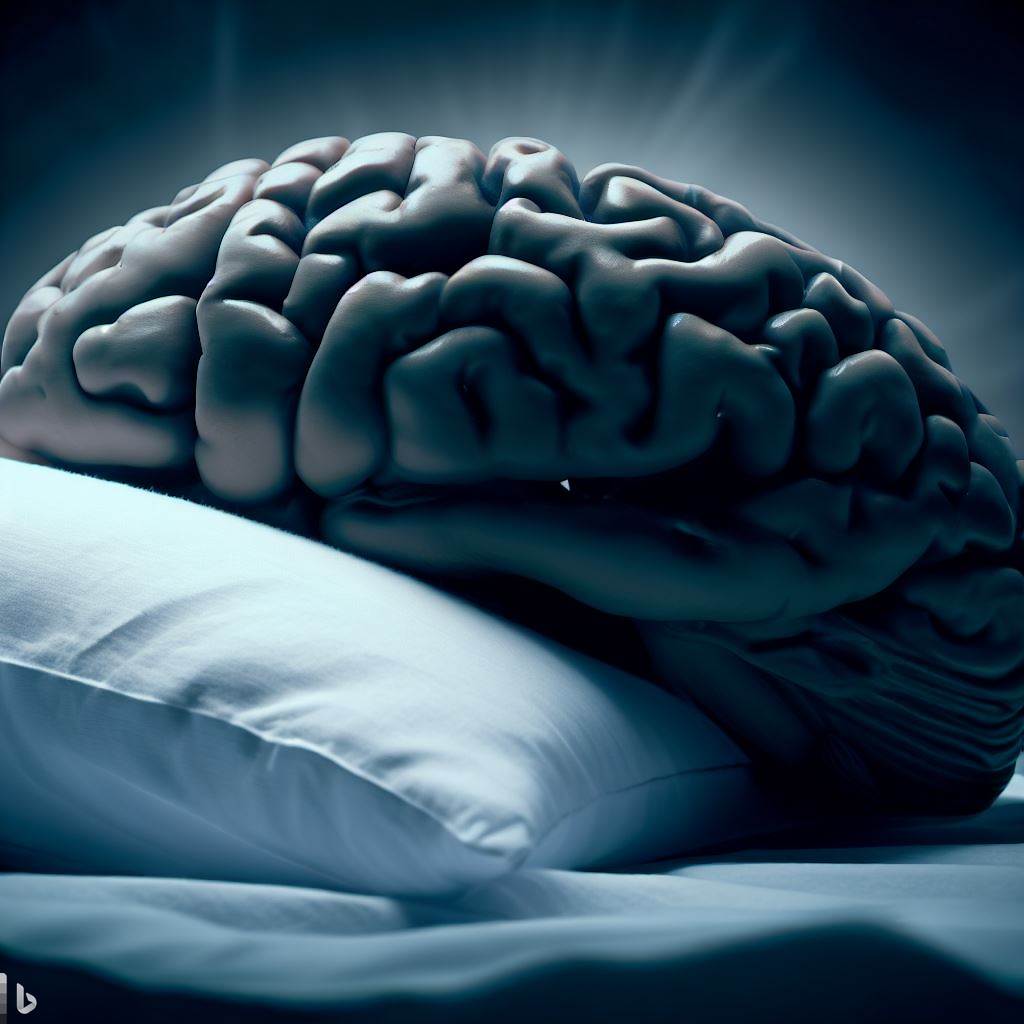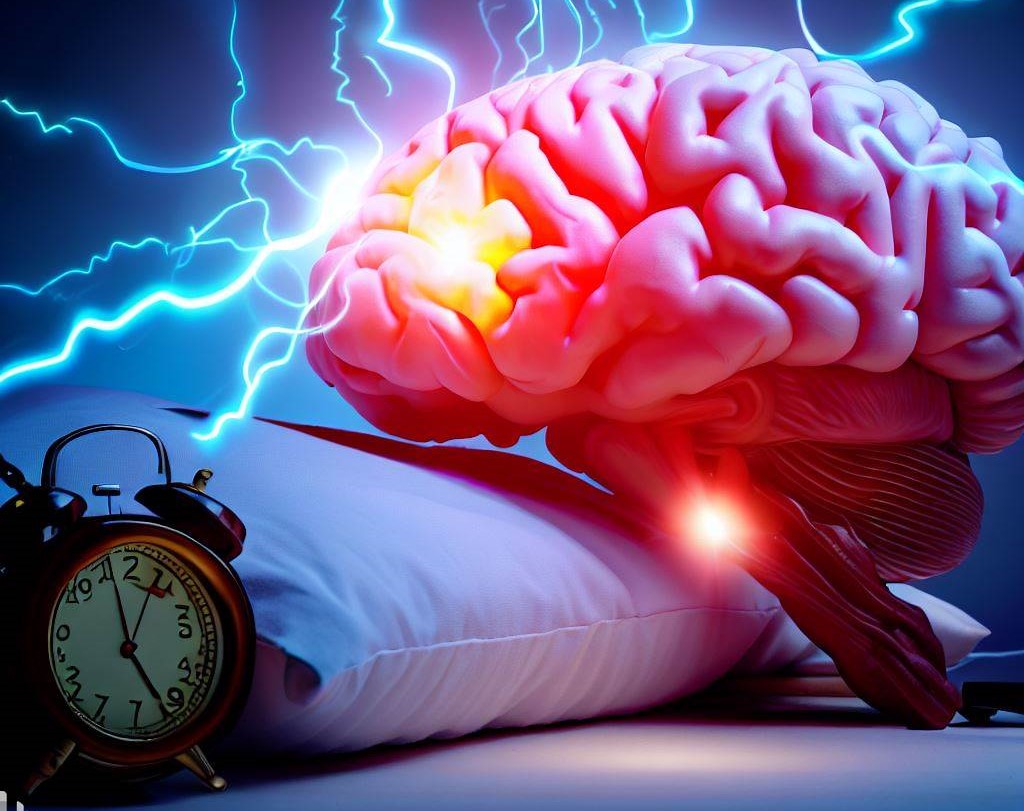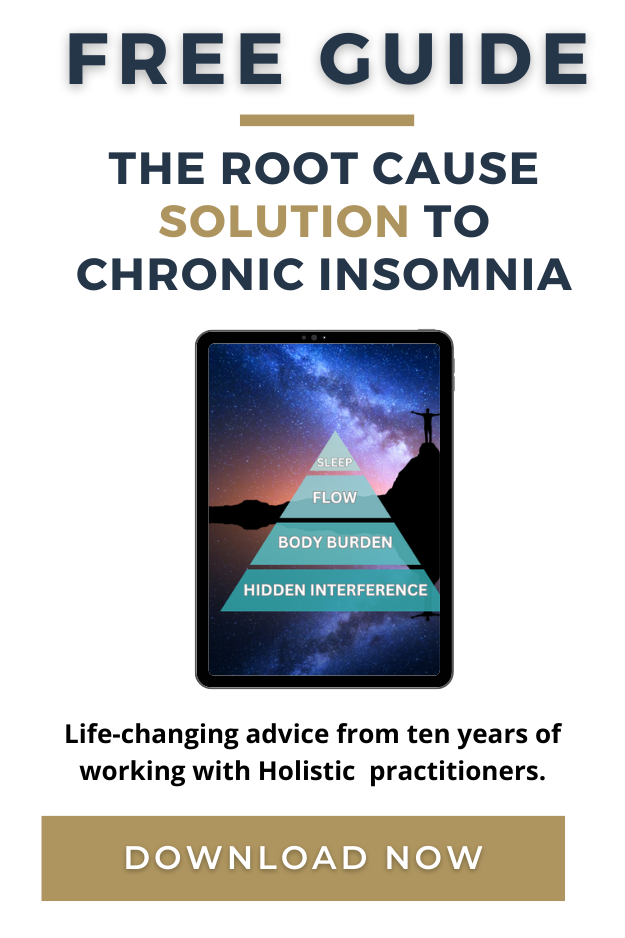Have you taken Glycine or L-Glutamine and are unable to sleep? Insomnia lasting several days, even weeks? These two amino acids have several functions in our body, and it is very difficult to guess as to how they trigger negative reactions but as insomniacs we should always suspect ammonia.
Usually it starts as a nice relaxing feeling, making one very sleepy, luring into a sweet illusion that one finally found something very divine for sleep. With time the feeling slowly morphs into shallow stimulation, agitation, head buzzing and restlessness. The real crap hits the fan when you hit the pillows… Instead of yawning, winding down and getting sleepy you realize that you are wide awake. The night turns into death by thousand cuts and this seems to last several days and nights. Angry, agitated and upset you unleash the internet. With a slight luck of correct keywords hopefully you land here…
First of all, please relax and rest assured that many insomniacs make this mistake. Yours truly, did it too. Several times! In this article I will briefly explain what can cause ammonia build up and how to lower it effectively. So here’s the lowdown…
Shortly put, when our liver is not functioning at its best it can produce a lot of so called metabolites. Ammonia is one of them. Ammonia is a toxic byproduct of metabolism (smoke from cooking) which should be removed from our body as waste. If this ammonia waste is not removed efficiently it builds up in our blood. Even slightly elevated levels (hyperammonemia) are toxic to your central nervous system (CNS) and will can cause symptoms ranging from brain fog, head buzzing (tinnitus) and yes – insomnia.
Naturally, the way our bodies purge ammonia is via the urea cycle which converts excess ammonia into urea in the mitochondria of liver cells. The formed urea then enters the blood stream, is filtered by the kidneys and is ultimately excreted in the urine. Flush it down.
There is an additional element: bile. Studies show the bile too contains ammonia in different quantities and suggest that bile could be an additional pathway for the removal of ammonia by the liver.
Noteworthy: 95% of your bile recirculates over the enterohepatic pathway (yes, it goes back to the liver from intestines) and that is why ammonia can recirculate for a long time until is slowly broken down and cleared out. This will come into context when I discuss some solutions below.
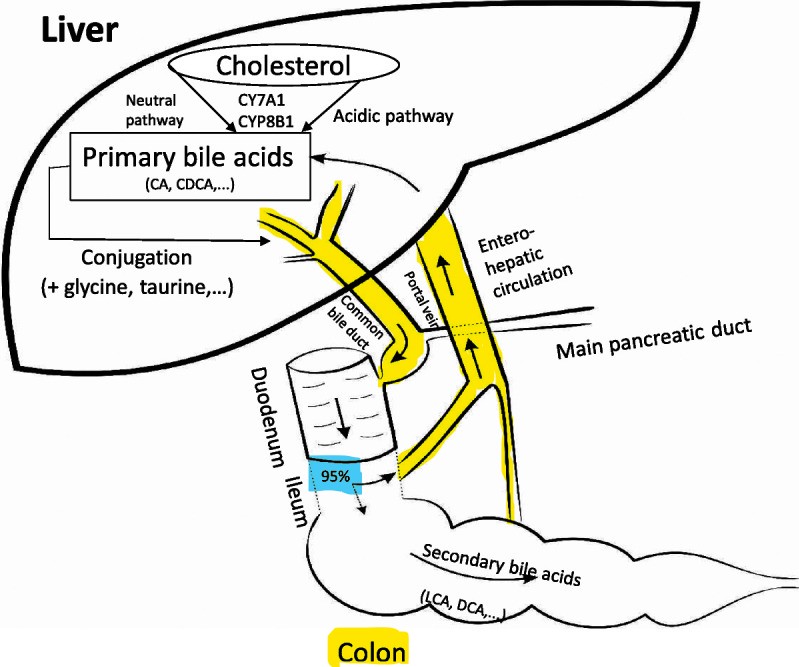
If not cleared out via urea cycle or bile (urine and stool) ammonia metabolites build up in blood, keep circulating in our system and affect brain function. The chain reaction usually causes a so called excitotoxicity (excitability of the nerves or NMDA receptors) which closely resembles a condition called Akathisia. The latter is often described by vague terms such as feeling nervous, uneasy, tense, twitchy, restless, and an inability to relax. Most will develop insomnia, a sense of discomfort, motor restlessness, anxiety, and panic.
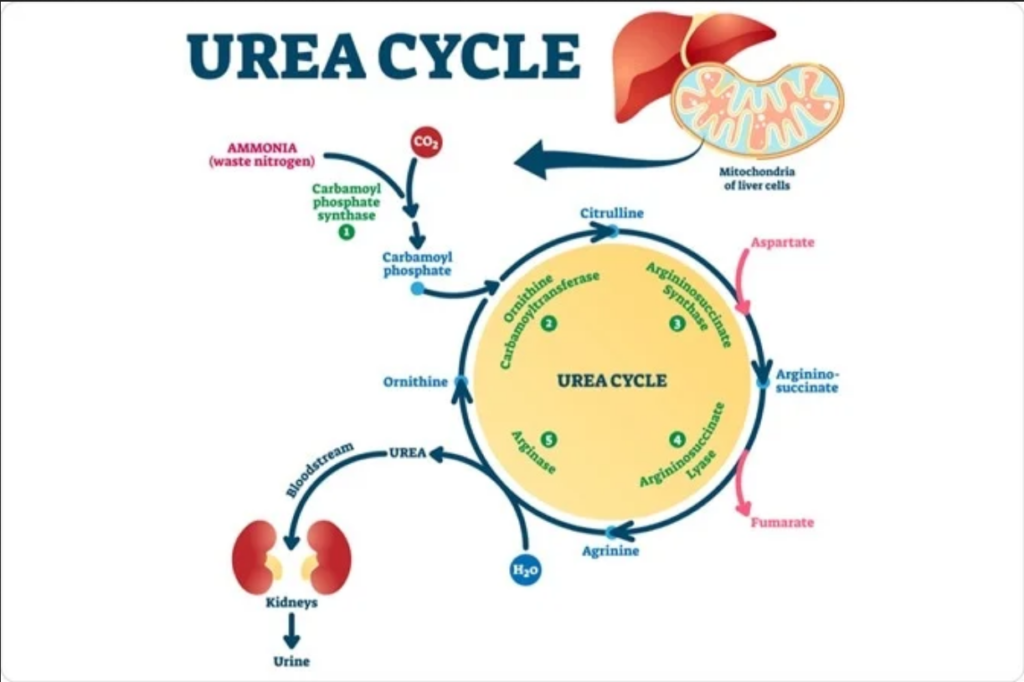
Mama, Why Does this Happen?
There are a few possible reasons but perhaps a perfect storm of:
1. Conditions normally implicated are some form of liver “disease”, reduced kidney function, genetics, Reye’s syndrome, seizures, starvation, and trauma. Lifestyle: high meat diet, intense physical activity, cigarette smoking, alcohol, stress. In my case it was an inflamed liver, low stomach acid, low enzymes, low bile function as part of systemic heavy metal intoxication, an impaired or slowed glutamate decarboxylase/GABA shunt pathway and gut dysbiosis.
3. An impaired liver will take longer to clear anything we throw at it. Sudden increase in ‘Total body burden’ overwhelms drainage pathways. The latter is a technical term for the way that food and compounds are processed and cleared by the body. This includes large doses of what seem to be benign supplements like Glycine or L-Glutamine.
4. Some research also points to gut bacteria. This too can be related to liver health. Compared to healthy individuals, the intestinal microbiota of people with liver disease is significantly different and is associated with a variety of GI disorders, including higher production of ammonia. Intestinal bacteria decompose protein into ammonia after which it can be absorbed into the bloodstream.
5. Medications that may increase ammonia levels include acetazolamide, ammonium chloride, ethyl alcohol, fibrin hydrolysate, furosemide, isoniazid, rifampin, thiazides, and valproic acid.
Science is complicated and frankly, the entire picture is beyond me and beyond most doctors too but the idea is clear. Check this out:
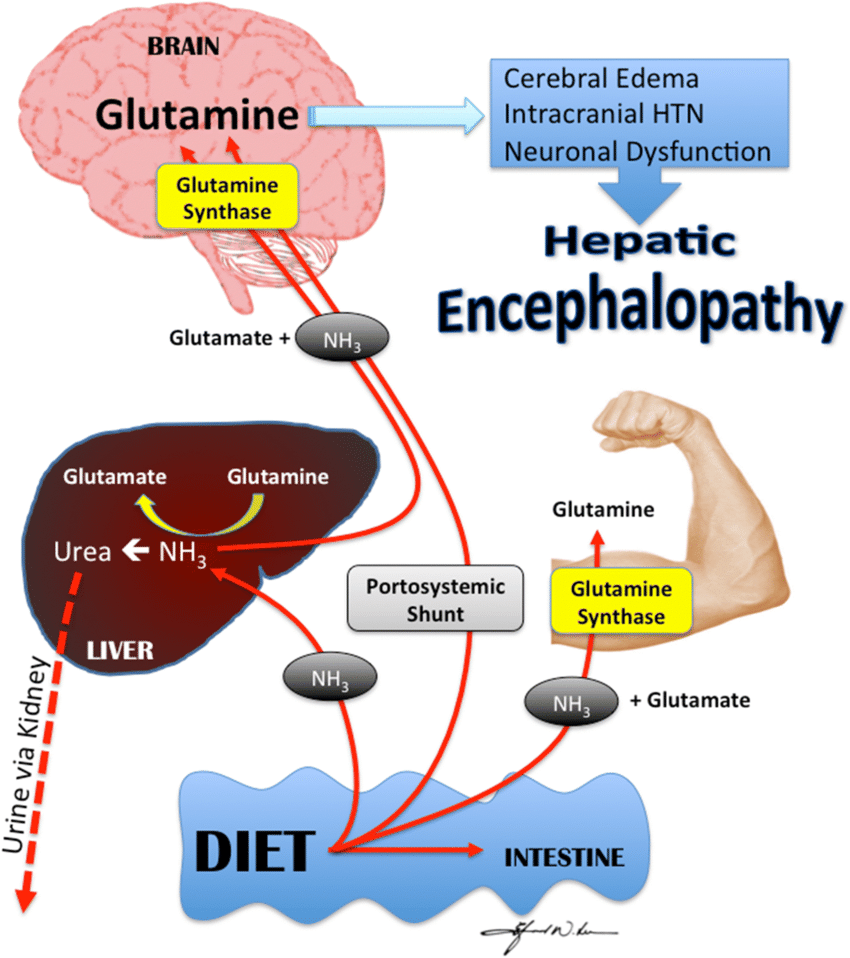
Key finding of this hepatic encephalopathy study on bold:
As a result of liver failure and cirrhosis, less ammonia is detoxified in the liver and portosystemic shunting allows a greater amount of ammonia to enter the systemic circulation bypassing the portal system. In cirrhotic patients, ammonia detoxification takes place less in the liver and more in the skeletal muscle and kidney. In liver, ammonia is converted to urea and then excreted through the kidneys and into the colon. In skeletal muscle and kidney, ammonia is converted to glutamine thus enzymatically removing the ammonia. In addition, astrocytes in the brain also play a role in detoxifying ammonia via glutamine synthetase, the increase in ammonia concentrations passing the blood–brain barrier results in increase in glutamine in the brain and this bring in more water into astrocytes. This swelling of astrocytes leads to cerebral edema and intracranial hypertension, ultimately resulting in neuronal dysfunction.
Head spinning? Tell me about it! I’ve been chasing my tail for years trying to understand all this. Most docs don’t get it too.
I’m sure you just want to know one thing: now what? Do we lower ammonia? Do we reduce glutamate? General advise seems to be – do both. But most importantly, and I’ll keep stressing this – address the root cause.
How Do I Reduce Ammonia?
Well, you want to do whatever the hell it takes to:
- Limit additional production;
- Dump (process) excess ammonia;
- Deactivate those NMDA receptors;
- Address the underlying cause in your liver, kidneys and digestion.
So step one, put out the fire, step two heal the underlying cause.
First, the fire part: we’re are looking for NMDA receptor antagonists. When it comes to meds there the opioids like methadone, dextropropoxyphene, and ketobemidone but these are not the droids we’re looking for. Addictive!
There are also other suggested medications in the literature (I have not tried): lactulose and lactitol. These sugars decrease the production and absorption of ammonia in your intestines. Theoretically, these would have been helpful at the introduction of Glycine or Glutamine because now it’s too late. So can they mop up the mess? Some research shows that Lactulose (constipation medication) may work by removing ammonia from the blood and moving it into the colon. Once in the colon, the ammonia is eliminated from the body when you go to the bathroom (read the diet tips below!).
The hack that works for me was discovered by pure luck and long time suffering. With time, I realized that histamine and ammonia ‘work’ through those same NMDA receptors. Antihistamines like simple non-drowsy Cetirizine dihydrochloride (Zyrtec) can calm the storm quite a bit. This can be found in any pharmacy. You can also try a more drowsy histamines that I wrote about before for more effect.
Antihistamine is a useful band-aid but we can’t take it for too long so let’s keep working the problem…
Things You Can Do to Lower Ammonia Right now
1. Limit protein, especially red meat. This only adds fuel to the fire so it makes sense to skip it altogether till the storm subsides. I often just go vegetarian for a few days and all that additional fiber and hydration only helps to mop up any ammonia from the intestines.
2. Zinc – try it if you tolerate it (not the glycinate form!, we had enough of glycine, right?) Studies show that Zinc reduces blood ammonia and increases liver ornithine. By the way, some suggest supplementing with L-Ornithine but it did not work for me and I felt like I was overburdening my liver even more.
3. Avoid wrong supplements. Some advice online suggests to take L-Glutamine. Whatever you do DO NOT DO RISK THIS! This can truly add more fuel to the fire. Stay away, very far away and read my previous post about L-Glutamine hype. Some wise researchers have discovered that glutamine is a “stealth” carrier of ammonia, the Trojan horse. In short, ammonia is a byproduct of the glutamine metabolism. Same goes for L-Glycine! Like glutamine, Glycine can also lead to changes in both blood and brain ammonia levels. Some studies that dug into ammonia liberating potential of different amino acids in patients with liver failure, have found Glycine to be “important in liberating ammonia”.
4. Vitamin B6 (pyridoxine) is an essential co-factor in the conversion of glutamate to GABA. Lack of vitamin B6 can result in diminished GABA synthesis and a buildup of glutamate. Why is this important with ammonia overload? If you can lower NMDA activity by converting more glutamate to GABA your body will have less load from ammonia.
5. Diet. Reduce your dietary glutamate sources (especially things like grains, aged cheese, beans, MSG laden restaurant meals, protein shakes) and try the same foods that help mitigate glutamate excitotoxicity. It is believed that the prominence of ginger, seafood, and nori in some Asian cuisines offsets the effect of the consumption of high-glutamate foods and MSG. Personally, healthy sushi and home cooked Asian meals are my staple go to meals: balanced and easy on digestion. Some people praise celery juice to help with kidney function and purifying the blood.
6. Probiotics. If you are not sensitive to them (due to SIBO or other gut issues) feel free to consider the so called Psychobiotics. These are probiotic supplements that provide mental health benefits by helping to produce neurotransmitters and facilitate communication between the gut and brain via the vagus nerve. Look for probiotics that contain either Lactobacillus brevis or Bifidobacterium dentium which have been found to be the best GABA producers. Also, you can get similar benefits from traditionally fermented foods such as unpasteurized sauerkraut, kimchi, kefir, and yogurt. Yep, keep it simple.
7. Purgatives. This is an interesting idea that I haven’t tried yet so do at your own risk. As already noted, laxatives play an interesting role in purging our bodies from ammonia. Some studies suggest using ammonia scavengers like l-ornithine l-aspartate as treatment for liver cirrhosis (shows ya how toxic ammonia actually is) point out that laxatives (in other words: inducing diarrhea) actually works. This study used Polyethylene glycol (PEG) and electrolytes combination solution (used to cleanse the bowel before certain medical tests or colon surgery) but note that “none were superior to lactulose (non-absorbable sugar used in the treatment of constipation) for the lowering of blood ammonia”.
8. Activated charcoal (AC). Now I honestly do not get why this is not mentioned among all the wise internet doctors. AC is often used to purify drinking water from ammonia and other unwanted substances. It’s nature’s finest filter! I use an activated charcoal binder in so many ways to support my recovery. Now, AC does not leave the gut wall but it does come in contact with bile. Remember the enterohepatic circulation issue mentioned before? Why not purify bile so that ammonia does not circulate back? Makes sense to me. Bentonite clay seems like a good option too.
9. Zeolite. These are porous minerals with high absorbency and ion-exchange capacity. Due to its capacity for absorption and exchange of ions, zeolites have an affinity for mycotoxins, ammonia, heavy metals, and organic compounds. Once bound, it enables the excretion of toxins from the intestine. Allegedly, Zeolite Clinoptilolite is even more effective than charcoal in reducing gut ammonia. I haven’t tried these and would be curious to hear your experience if you do.
10. GABA promoting herbs and supplements: L-Theanine, Passionflower, Valerian, Lemon Balm, Hops, etc. Calm and smooth is what we want here. A new kid on the block is Honokiol (derived from Magnolia bark) is said to reduce cortisol and also glutamate. All of these relaxes the nervous system through converting glutamate into GABA, creating a chill inhibitory effect.
11. Sweating. Ever wonder why your sweat sometimes smells like ammonia? That is because our skin is a major detox organ and what is not processes by urea or bile can be excreted by sweat. This is so simple, free and effective that it is impossible to ignore. I find sauna immensely helpful to reduce any circulating toxins that are agitating my nervous system.
12. Walking or exercising in nature is one of the most helpful things you can do to move your lymph, activate your organs, calm the mind and drain that excess ammonia. Caution: exercise has to be light because strenuous exercise can produce even more ammonia!
How Long Will it Take Before I can Sleep Again?
It all depends on your liver health, how fast you can reduce your overall body burden with other mentioned factors, how quick you can push it out via urea cycle (hydrate well!) and then how fast you can bind that ammonia laden bile and excrete it via stool.
This can take anywhere from several days to three weeks. Meanwhile, you have some advice on how to mitigate the symptoms and push it out of your system sooner than later. Hang in there and soon you’ll get over this. Once you do, it will be time to address the underlying liver issues that had led to this crisis in the first place.
In short, don’t merely rely on hacks and supplements to reduce ammonia. Limit your ammonia producing food and lifestyle choices and avoid ammonia liberating supplements like L-Glutamine and L-Glycine. Look after your liver, kidneys and gut health so that ammonia is processed and drained from your system without any effort. A healthy body will clear out all excess ammonia on itself.
If the advice worked or you have some of your own please let me know in the comments. I am always learning and some of the best tips often comes from my sleep hacking comrades.
